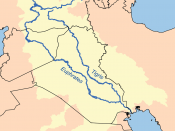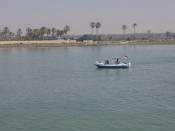The western world was a very dry land. It was a place where deserts were very prominent, and water was scarce. Thus, the people who lived in this time needed to dwell near water. When the population in these areas increased, there was a need to expand. With this expanse, they moved farther away from the rivers and water sources. This meant that there needed to be some advancement that would allow them to move the water from the source to the outskirts of their civilization.
Robert MaC. Adams used a map in "Heartland of Cities; Surveys of Ancient Settlements and Land Use on the Central Floodplains of the Euphrates"ÃÂ showing the ancient levees that were found between the Tigris and Euphrates rivers. This is an example of how the ancient people had to make inventions to help themselves survive. These levees did not just appear though. It was a slow process of invention and resourcefulness that allowed them to make the adjustments needed to farm and to grow.
The Code of Hammurabi spends a good amount of energy and time on the importance, maintenance and effectiveness of dikes and canals. They were very important to their civilization because, in a sense, these things were their lifelines. Dikes decided which fields the water flowed to and which ones they did not go to. So, the maintenance of the dikes was very important. If your dike broke, you were to be responsible for whatever damage the floods caused.
The Romans has a similar code in which they laid out how their aqueduct system was to be run. In Vetruvius's Description of the Roman Aqueduct System, he tells of where the supply of water came from. "The supply of water is made by three methods: by channels through walled conduits, or by lead pipes, or by earthenware pipes."ÃÂ The structures were to be very solid and sturdy. There could not be too steep of a rise on the pipes and the amount of water passing through them was to be regulated.
All these things show how the need for a steady supply of water affected life and the development of ancient western civilizations. They needed water and had to use science and invention to survive. It is said that necessity is the father of invention. The people in the ancient western world were rewarded by their inventions and were able to expand their societies because of a fundamental need.





